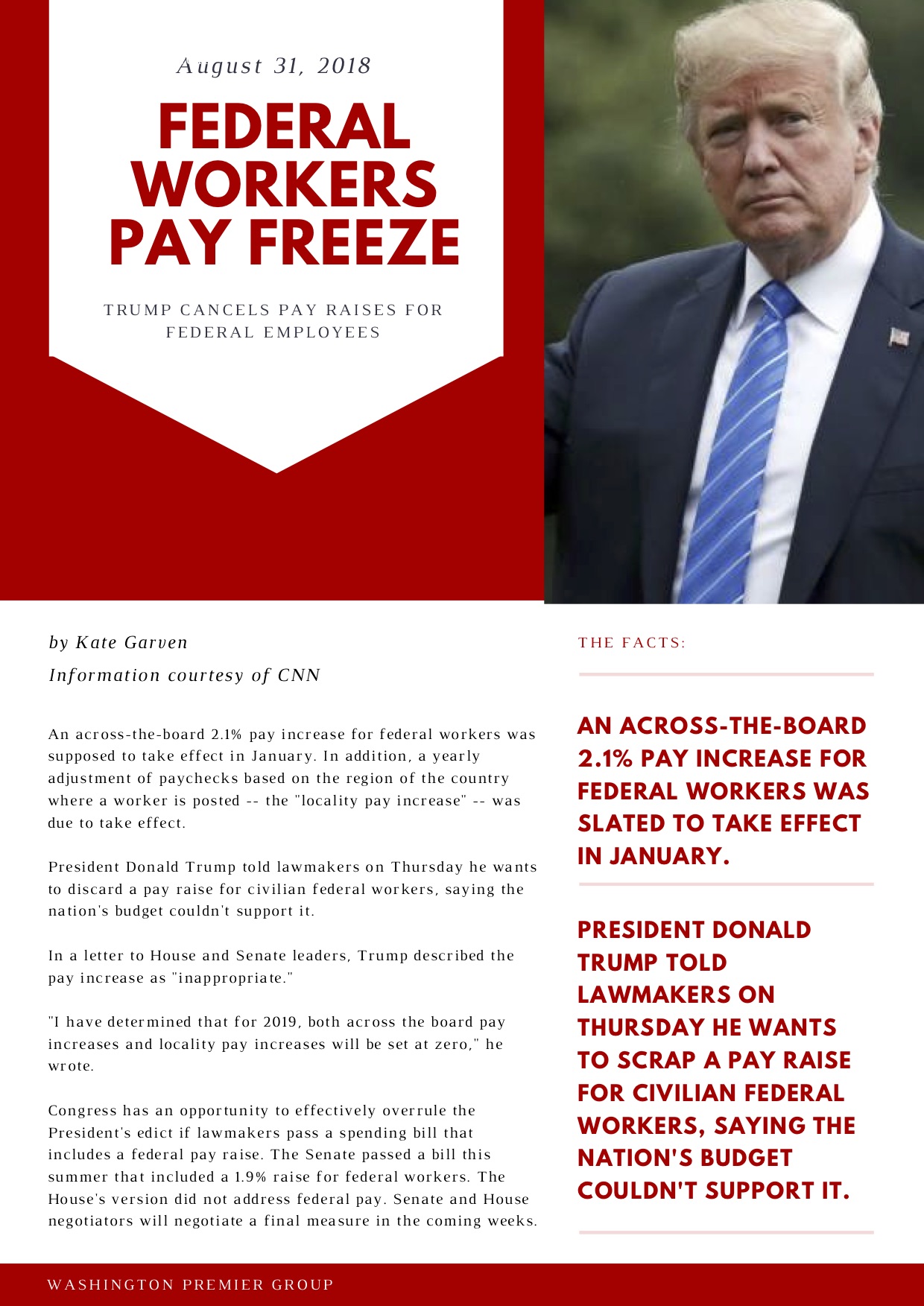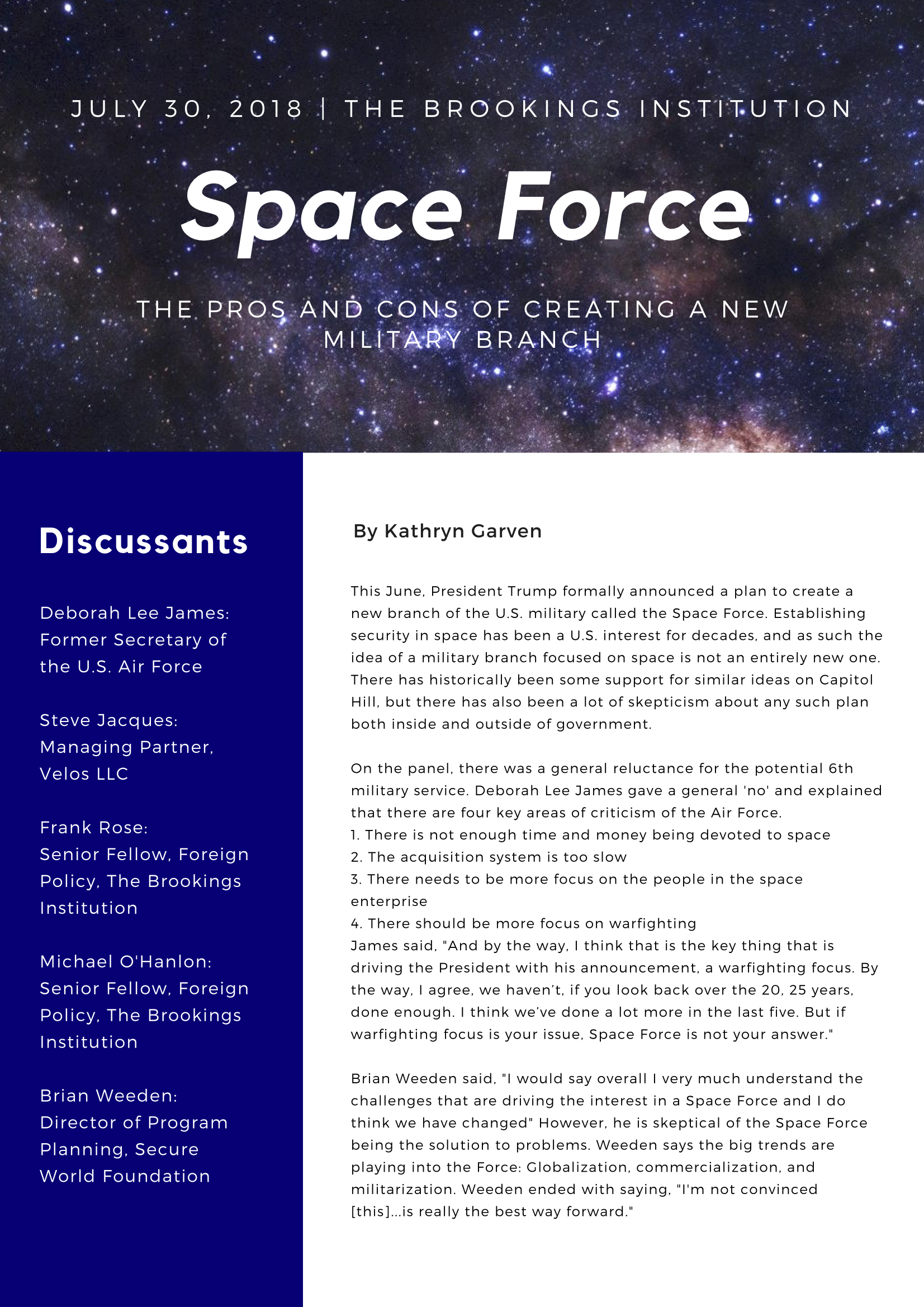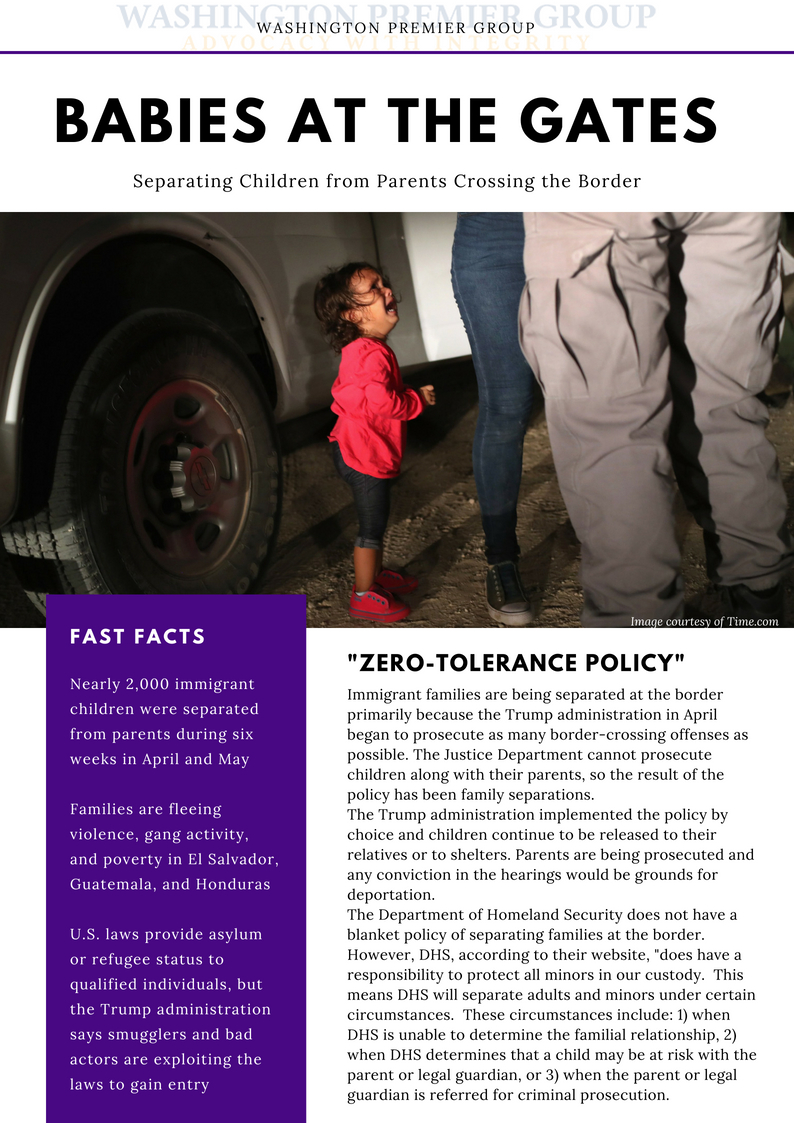Space Force: The Pros and Cons of Creating a New Military Branch
Federally Employed Women - 50th National Training Program
Principal of WPG, Tonya Saunders, spoke about legislation and advocacy last week at Federally Employed Women's 50th National Training Program in Atlanta, Georgia.
Read MoreHuman Rights and Data Event
The Brookings Institution event, Human Rights and Data, surrounded the issues of data protection and security. The flow of data across the Atlantic continues to be at the center of economic, political, and diplomatic conversation between the United States and European Union. In `t Veld is working towards "finding the right balance between government powers and individual freedoms." Individual freedoms are a legal right and legally enforceable.
Read MoreExamining the Importance of Paid Family Leave
On July 11, 2018 the Senate Finance Committee’s Subcommittee on Social Security, Pensions and Family Policy held a hearing on "Examining the Importance of Paid Family Leave for American Working Families.
Read MoreBabies at the Gates: Separating Children from Parents Crossing the Border
Created by Kathryn Garven
- CLICK IMAGE TO GO TO NEXT SLIDE -
Photos on Capitol Hill with American Occupational Therapy Association
Tonya Saunders of WPG pictured with Puerto Rican members of AOTA
Paid Family Leave
From the desk of Kathryn Garven
WHAT IS THE FAMILY ACT?
The Family and Medical Insurance Leave (FAMILY) Act [S. 337/H.R. 947] would address America’s paid family and medical leave crisis and benefit working people, their families, businesses, and our nation’s economy. The bill, sponsored by Senator Kirsten Gillibrand (D-NY), was introduced into Congress on February 7, 2017 and is in the first stage of the legislative process. Senator Gillibrand’s bill promises up to 12 weeks of paid time off through a shared fund that makes paid leave affordable for employers of all sizes and for workers and their families. The 12 weeks would be partial income to take time for their own serious health conditions, including pregnancy and childbirth recovery; the serious health condition of a child, parent, spouse, or domestic partner; the birth or adoption of a child; and/or for particular military caregiving and leave purposes.
WHY IS THE FAMILY ACT IMPORTANT?
The United States is currently the only industrialized nation without a national paid leave program, and only 14% of American workers have access to paid family leave through their employer. Without a national paid family leave program, the U.S. economy loses almost $21 billion a year, women lose $324,000 in wages and retirement benefits over a lifetime, and men loe $284,000. Studies show that businesses incur an additional 20% cost to recruit and retain new workers replacing others who left because they did not have paid leave.
IS PAID LEAVE AFFORDABLE?
The FAMILY Act is funded responsibly by small employee and employer payroll contributions of two-tenths of 1% each (two cents per $10 in wages), or less than $1.50 per week for a typical worker. The Act creates a self-sustaining family insurance program for all workers -- young and elderly, single and married, men and women - regardless of the size of their employer. It is modeled after successful state programs, and costs only as much as a cup of coffee per week. The fund would provide up to 66% of wage-replacement for 12 weeks in the event of a serious personal or family medical emergency.
SOME STATISTICS
78% of voters say they would favor -- including 64% who “strongly favor” -- establishing a national law that provides 12 weeks of paid family and medical leave
93% of Democrats support paid family and medical leave
77% of Independents support paid family and medical leave
66% of Republicans support paid family and medical leave
64% of voters in 15 “battleground” states say they are willing to contribute to a paid leave fund, and both lower- and higher-wage workers are equally willing to contribute
Among paid leave supporters, nearly nine in 10 (86%) are willing to contribute
72% of paid leave supporters are willing to contribute much more than the FAMILY Act would require
WHY SHOULD THE FAMILY ACT BECOME A NATIONAL LAW?
“Without a national paid leave program, too many Americans must choose between their family responsibilities and their paychecks. This needs to change. That’s why I’m cosponsoring Senator Gillibrand’s FAMILY Act. This bill is good for families, good for businesses, and good for our economy.”
Senator Elizabeth Warren (D-MA)
The FAMILY Act brings families together and makes bonds stronger within families, communities, and between employers and employees. So far only a few states have enacted their own family leave laws, including California, Connecticut, District of Columbia, Hawaii, Maine, Minnesota, New Jersey, Oregon, Rhode Island, Vermont, Washington, and Wisconsin. Only California, New Jersey, New York, and Rhode Island currently offer paid family and medical leave and only five states currently have paid sick leave. Only 12% of our workforce has access to paid family leave. No one should have to choose between a paycheck and caring for themselves or a loved one. It is important that everyone has access to paid leave so we can better ourselves and our families without fear of losing income. Senator Tammy Baldwin (D-WI) said, “The FAMILY Act is an important step in building an economy that works for everyone.”
Congress is currently looking at the option of mirroring California’s paid family leave. In the state of California, payroll deductions fund a state-run insurance pool that allows employees to take off up to six weeks at partial income. The public programs provide pay for workers whose employers don’t offer the benefit -- and the local government wants to see the local efforts spread.
WHAT CAN I DO TO HELP PASS THE FAMILY ACT?
Call, write a letter, email, set up a meeting, or use social media to get in touch with members of Congress that represent you and tell them why the FAMILY Act matters. Define your objective, get to know the issue thoroughly, and communicate with your legislators from several sources. Give thorough attention to your position, the position of your opponent, the status of any pending legislation relating to the issue, and your elected official’s current position. One simple phone call could make the critical difference.
Contact us: wpgintern@gmail.com
Information Gathered From:
http://www.ncsl.org/research/labor-and-employment/state-family-and-medical-leave-laws.aspx
https://www.govtrack.us/congress/bills/115/s337
http://money.cnn.com/2017/07/31/news/economy/kirsten-gillibrand-family-act/index.html
http://www.nationalpartnership.org/research-library/work-family/paid-leave/family-act-fact-sheet.pdf
https://www.congress.gov/bill/115th-congress/senate-bill/337
Equal Rights Amendment: Only One More to Go
From the desk of Kathryn Garven
On May 30, 2018, Illinois became the 37th state to ratify the Equal Rights Amendment (ERA), when the House passed a ratification bill by a vote of 72-45. Ratification of the ERA by one more state will meet the Constitutional requirement for approval by three-quarters of the states. The states left who have not ratified the ERA are: Alabama, Arizona, Arkansas, Florida, Georgia, Illinois, Louisiana, Mississippi, Missouri, Nevada, North Carolina, Oklahoma, South Carolina, Utah, and Virginia. Five states have voted to rescind or otherwise withdraw their ratification of the ERA: Nebraska (1973), Tennessee (1974), Idaho (1977), Kentucky (1978), and South Dakota (1979).
Washington Premier Group and Federally Employed Women (FEW), are fighting for the ratification of the ERA. Below is pictured FEW’s president, Wanda Killingsworth, and ERA supporters at the recent rally held by Rep. Maloney (D-NY) outside of the Capitol Building.
Visit http://www.eracoalition.org/ for updates and more information on the ERA.
Women Just Can't Win: Medicaid Work Requirements and Inadequate Workplace Policies
From the desk of ... Katie Martin
This Blog Written and Provide by: The National Partnership’s Vice President for Health Policy, Katie Martin.
February 28, 2018 | Health Care
Here’s an idea for politicians who claim they want to help women and families become more financially secure: Don’t institute punishing work requirements in programs that are meant to help people achieve and maintain economic security. Instead, promote and protect access to affordable, quality health care and supportive workplace policies.
This appears to be a foreign concept for the Trump administration and congressional leadership. Last month, the Centers for Medicare & Medicaid Services (CMS) approved problematic work requirements in Kentucky and Indiana’s Medicaid programs. Trump followed suit with a 2019 budget that proposes work requirements for critical programs that lift women and families out of poverty and combat persistent inequality.
Medicaid work requirements are especially punitive for women, who must contend with workplaces that don’t reflect or support the complexity of their lives in order to meet stringent work requirements under Medicaid and maintain the health coverage they need.
Medicaid is a vital source of health coverage for millions of women: 17 percent of women in the United States are enrolled in Medicaid. Due to racism and other systemic barriers that have contributed to income inequality, women of color are disproportionately likely to be insured through Medicaid: 31 percent of Black women and 27 percent of Hispanic women aged 15–44 were enrolled in Medicaid in 2015, compared with 16 percent of white women. Medicaid pays for nearly half of all U.S. birthsand is the largest payer of publicly funded family planning services.
Most women who are enrolled in Medicaid (56 percent) already hold jobs. Many of those who do not are caring for family members, have a serious illness or disability or attend school. Still, nearly two-thirds of those at risk of losing Medicaid coverage because of work requirements are female.
It is already challenging for women with health conditions or who are caring for loved ones to work, and Medicaid work requirements will only make this harder. This is in part because far too few women have access to paid family and medical leave. In fact, fewer than 60 percent of workers have access to unpaid leave under the Family and Medical Leave Act (FMLA), leaving more than 40 percent without access to job protection when they need to take leave for medical reasons. This means, for example, that a woman not covered by the FMLA who is enrolled in Medicaid could lose her job if she takes time away from work to get cancer treatment, and then lose her health coverage due to Medicaid work requirements. Losing Medicaid could be a death sentence for this woman. At the very least, this would severely threaten her ability to get the care she needs and maintain her economic stability.
Medicaid work requirements could also block people with hourly and seasonal jobs from keeping their coverage. Women make up two-thirds of the nearly 23 million low-wage workers in the United States. Many low-wage workers have variable hours, and an inflexible Medicaid work requirement could cost them health coverage if their hours drop below a certain level.
Seven in 10 low-wage workers are unable to earn a single paid sick day. For these low-wage workers who are enrolled in Medicaid, a single sick day could mean losing their job and then their health care. Job loss due to lack of paid sick days is not uncommon. Overall, nearly one in four U.S. adults reports having lost a job or being told they would lose a job for taking time off due to illness or to care for a sick family member. In addition, women are more likely to be primary caregivers of children and older adults, making them particularly vulnerable if they need to take a sick day to care for a loved one.
Even if the United States adopted family friendly workplace policies, Medicaid work requirements would still be punitive, ineffective, administratively burdensome and entirely without justification. These requirements are about driving people off Medicaid, not empowering them or improving their lives. In fact, the states applying for waivers to implement work requirements even acknowledge estimated coverage losses in their applications.
Ultimately, states that choose to implement Medicaid work requirements will compound the harm women already experience from inadequate workplace policies, undermining women’s health, well-being and economic security. More states should instead expand Medicaid — without work requirements — and connect more women to the health care they need to get and stay healthy.

















